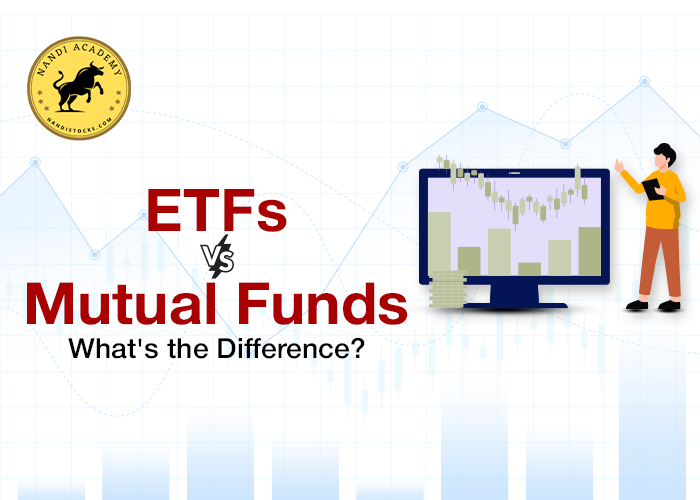
ETFs vs. Mutual Funds – What’s the Difference?
Investing in financial markets has become more accessible than ever, with a variety of investment options available to both new and seasoned investors. Two of the most popular investment vehicles are Exchange-Traded Funds (ETFs) and Mutual Funds. While they share some similarities, key differences make each suitable for different types of investors. In this blog, we’ll explore the fundamental differences between ETFs and Mutual Funds to help you decide which one aligns better with your investment goals.
What Are ETFs and Mutual Funds?
Exchange-Traded Funds (ETFs)
ETFs are investment funds that trade on stock exchanges, much like individual stocks. They are designed to track the performance of an index, commodity, sector, or other asset. ETFs offer diversification and liquidity, making them an attractive option for many investors.
Mutual Funds
Mutual funds pool money from multiple investors to invest in a diversified portfolio of stocks, bonds, or other securities. Managed by professional fund managers, mutual funds aim to achieve specific investment objectives, such as growth, income, or capital preservation.
Key Differences Between ETFs and Mutual Funds
1. Trading and Liquidity
- ETFs: Trade on stock exchanges throughout the day at market prices, just like stocks. Investors can buy or sell ETFs at any time during market hours.
- Mutual Funds: Priced once per day after the market closes. Investors can only buy or sell at the Net Asset Value (NAV) determined at the end of the trading day.
2. Management Style
- ETFs: Typically passively managed, meaning they track an index rather than actively selecting securities. This generally results in lower fees.
- Mutual Funds: Can be actively or passively managed. Actively managed funds involve fund managers selecting stocks to try and outperform the market, which may lead to higher fees.
3. Costs and Fees
- ETFs: Generally have lower expense ratios due to passive management. Investors may also pay brokerage fees when buying or selling shares.
- Mutual Funds: These may have higher expense ratios, especially for actively managed funds. They can also have sales charges, known as loads, which can increase costs.
4. Tax Efficiency
- ETFs: More tax-efficient due to their structure. Investors generally pay capital gains tax only when selling shares.
- Mutual Funds: Less tax-efficient because capital gains distributions occur within the fund, meaning investors may incur tax liabilities even if they don’t sell shares.
5. Minimum Investment Requirements
- ETFs: No minimum investment requirement beyond the cost of a single share.
- Mutual Funds: Often have minimum investment requirements, which can range from a few hundred to several thousand dollars.
Which One Should You Choose?
The choice between ETFs and Mutual Funds depends on your investment goals, risk tolerance, and trading preferences.
- ETFs are best for: Investors who prefer intraday trading flexibility, lower expense ratios, and tax efficiency.
- Mutual Funds are ideal for: Investors who prefer professional management, and structured investment strategies, and are not concerned with real-time trading.
Conclusion
Both ETFs and Mutual Funds offer excellent investment opportunities, each with unique advantages. ETFs may be the better choice if you value flexibility, lower fees, and tax efficiency. However, mutual funds might be more suitable if you prefer professional management and structured investment plans. Understanding the differences between these two investment options can help you make informed decisions and build a portfolio that aligns with your financial goals. Whether you’re a beginner or an experienced investor, Nandi Academy of Stock Market, the best stock market institute in Panchkula Chandigarh, offers expert guidance to help you navigate these options. Additionally, if you’re looking to enhance your financial knowledge, their stock market courses provide in-depth training on various investment strategies.